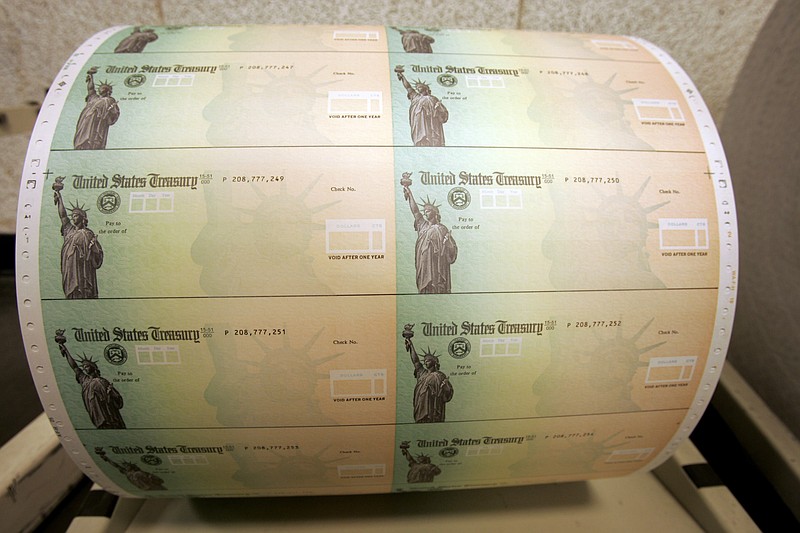That congressional Democrats can look anyone in the eye today after passing a $1.9 trillion bill and call it COVID relief is beyond belief.
Oh, there's some of that in there, sure - about 9% if you listen to Republicans. Their congressional foes, in their widest stretches, say about a quarter of the measure will go to coronavirus response. Both say less than 1% goes to vaccines.
Another quarter funds those $1,400 checks, which will go to some individuals whose businesses had to close or who remain out of work. But millions and millions of them will go to people who have never lost their job, never missed a meal, never got sick, never saw their pay reduced and who have lived their lives - with the inconvenience of masks and social distancing - the same way they did before the pandemic.
Nobody wants to turn down "free" money, but the truth, of course, is the bill will be paid down the road by our children, grandchildren and great-grandchildren.
Yet another quarter of the spending goes to state and local governments, many of which have weathered the pandemic without significant downturns.
Even Democrats will admit that at least 15% of the bill - about $300 billion in spending - has no relation whatsoever to the misery we've been through over the past year.
But here's a few things about the bill you may have missed:
- The national media is trumpeting phrases like "the COVID relief bill will cut childhood poverty in half." Really? How can you make poverty go away in a year, which is the amount of time for which new tax credits will be given? You can't, of course.
Low-income Americans would get the $1,400 stimulus checks, but also $3,000-$3,600 in refundable tax credits for each child under 18. The already existing Earned Income Tax Credits also would be expanded, as would existing tax credits to care for children and dependents.
But do we need to add that Democrats want to make many of these expansions permanent?
(READ MORE: Biden sets May 1 target to have all adults vaccine-eligible)
Less than 30 years ago, during the Democratic Clinton administration, the Personal Responsibility and Work Opportunity Reconciliation Act of 1996, finally began to wean Americans off welfare and put them back to work. If the tax credits become permanent, analysts say it will become the biggest expansion of welfare in more than 50 years.
- Union pension plans will be bailed out in the bill with $86 billion. Multi-employer pensions, some 124 of which are in "critical and declining" condition, will be able to apply for federal grant funding, which would then help pay their retired workers over the next 30 years.
Yes, the workers aren't at fault, but the unions are for promising such generous benefits that they, ultimately, couldn't pay. It should not fall to the government to prop up such unions because they're certainly not falling in line to bail out all private pensions who may be in need.
- The bill includes three tax increases, added late in the legislative process. One removes deductions for publicly traded companies who pay their top employees more than $1 million. One alters how multinational corporations do their taxes. And the third one changes how owners of unincorporated businesses account for their losses.
Most of us won't be touched by them, but taxes on big businesses during a pandemic can mean those companies output less, employ fewer and don't expand, none of which helps the economy.
- The bill will increase what the government kicks in for you to enroll in Obamacare. In fact, Americans making 100-150% of the poverty level won't have to pay any premiums for some plans. Those making more than 400% of the federal poverty level - more than $51,000 per year - also will see increased subsidies.
Each permanent addition to the budget - mandatory spending, which would have to be passed by Congress - means less discretionary, or optional, spending for the government. In 1962, discretionary spending was more than 65% of federal spending. Today, it's around 30% and declining.
- The bill doesn't wipe out anyone's student loan - yet. But it does say that any student loan forgiveness bill passed between Dec. 31, 2020 and Jan. 1, 2026, will be tax-free.
Forgiven debt, it turns out, is treated as taxable income. So wiping out a $50,000 debt would be like adding $50,000 to your earnings. But the bill makes any future forgiveness during the period - Biden wants to forgive at least $10,000 in the near future, perhaps by executive action - free of taxes.
Whatever the eventual forgiven amount is, it will be a massive lack of money going into the U.S. Treasury, which increasingly needs every penny it can get.
We could go on. Democrats have tucked expensive goodies all through the bill. Not necessarily for COVID, but in the hopes voters won't remember it's all taxpayer money and that the tab will one day come due.
